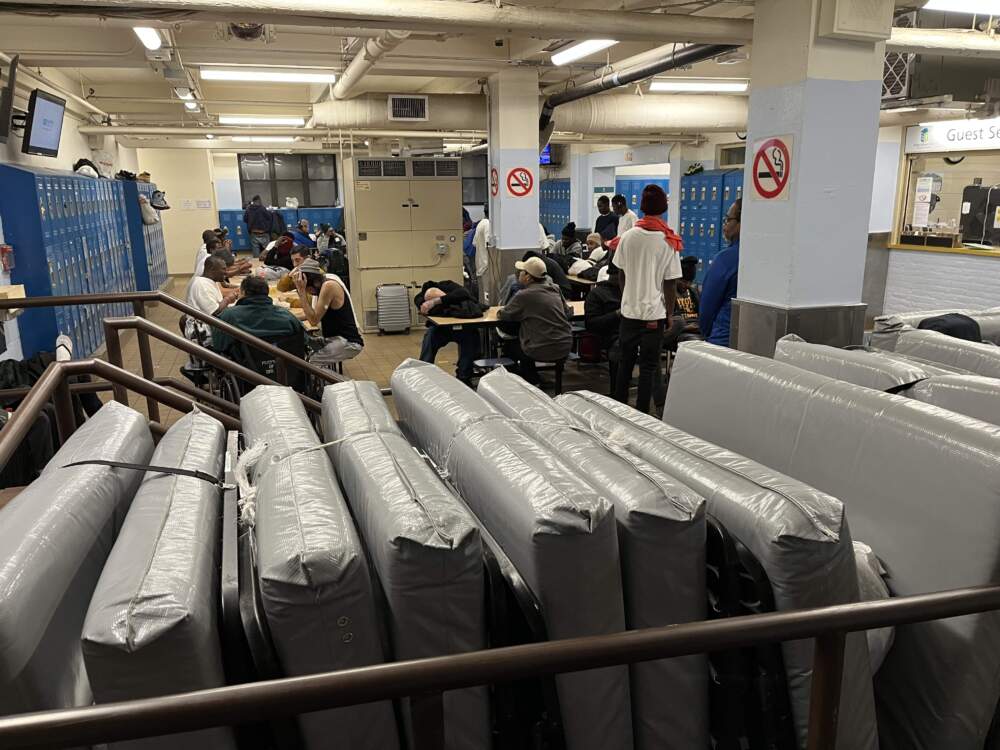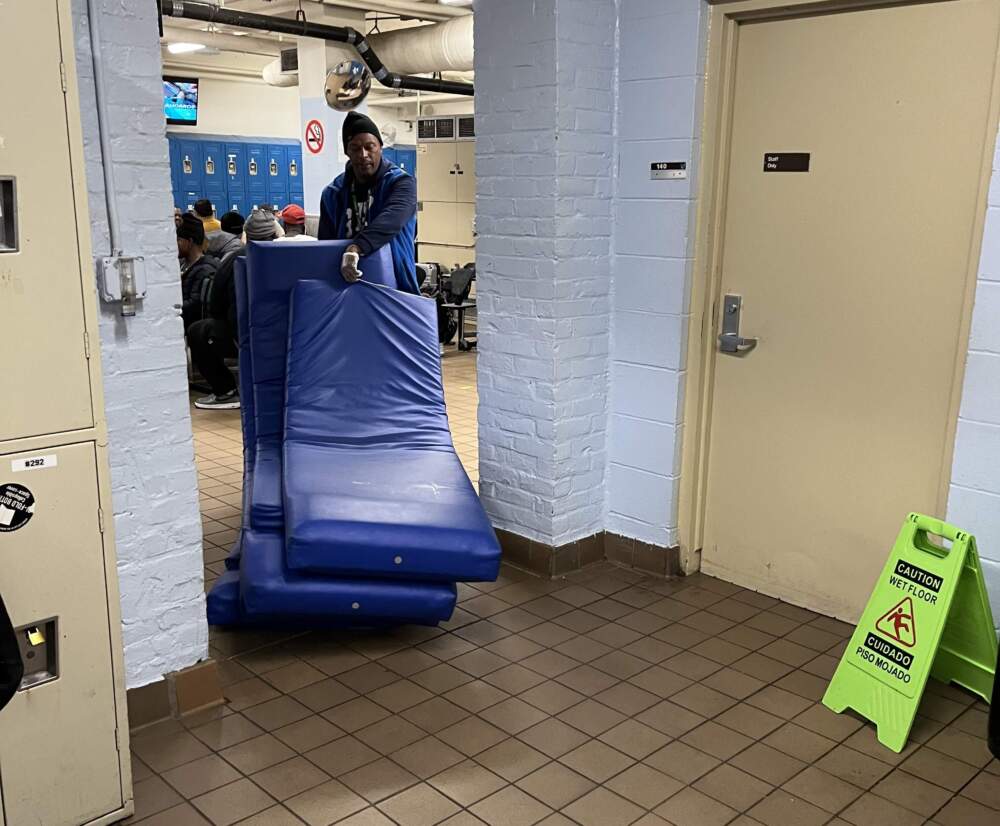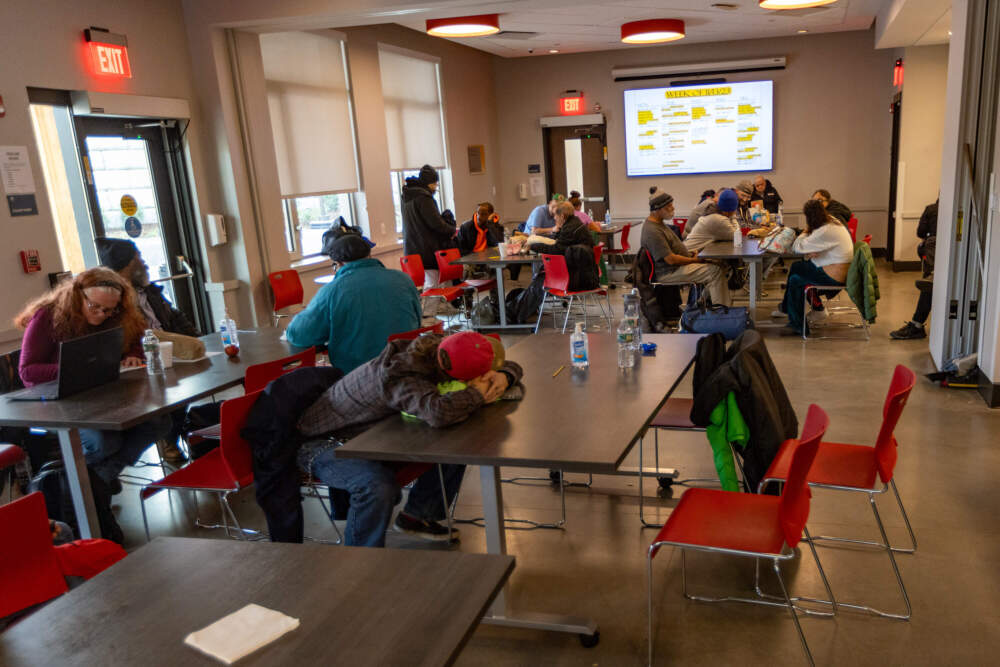Advertisement
With adult shelters in Mass. overflowing, advocates worry about winter
Emergency homeless shelters that serve adults in Massachusetts are at or over capacity and on the brink of a crisis, according to shelter providers and advocates.
This comes as the family shelter system, which is overseen by the state, recently reached Gov. Maura Healey's new cap on the number of families it can admit. Family shelters are full, and a few thousand families are staying in hotels and motels that are acting as temporary shelter facilities.
Although the adult shelter population always swells as winter approaches, advocates and officials say in many places, the increase in individuals seeking shelter happened much earlier than normal and in larger numbers than expected.
Facing what they says is a dire situation, several advocates and homeless service providers sent a letter to Healey calling for the state to open large overflow shelter facilities for the cold months. Anyone facing homelessness — from unaccompanied youth and adults to families — should have access to those emergency facilities, they said.
"We are calling for a winter plan this year like never before, that will really provide some kind of emergency shelter response for all vulnerable people," said Joyce Tavon, CEO of the policy and advocacy organization Massachusetts Housing & Shelter Alliance. "Are there military bases, large sites that could be used for winter response?"
Healey has called on the federal government to set up large overflow shelter sites for families. So far, her office and the state's Executive Office of Housing and Livable Communities, which oversees the family shelter system and provides funding to adult shelters, have not announced any such deal with the federal government or answered WBUR's questions about whether the state will set up large overflow shelter sites for all populations this winter.
The office of housing said 608 extra shelter beds for adults are coming on line across the state for the cold months — just over 200 of them beds that were not put up last winter. Extra beds are typically put up by some shelters, churches and municipalities across Massachusetts each winter, with some funding help from the state. But advocates fear the effort won't be enough this year.
On Monday, state officials announced they're opening a temporary shelter space for up to 25 families at the State Transportation Building in Boston.
"I think I understand why [there's a] focus on families, because you cannot have kids out there in the cold," said Lyndia Downie, president and executive director of Pine Street Inn, a shelter and housing provider in Boston. "But at the same time, we don't want anybody to be out there in the cold, and we've all got to really figure out a way to get through the next few months."
Advertisement
A look at the numbers
According to the Boston Public Health Commission, on Oct. 31 of this year, the number of people staying in adult homeless shelters in Boston was 16% higher than on the same date last year.
Between 75 and 100 more men stayed at the Pine Street Inn's main shelter every night this October than on the same dates in 2022, according to the nonprofit's own data. The women's shelter has also seen an increase this fall.
On a recent night, dozens of men sat at tables, some playing cards, or milled around inside a large common room and the lobby of the Pine Street Inn men's shelter. Rollaway cots and mats were lined up and stacked along the walls, waiting to be put out as extra beds overnight because the shelter's dorm is full.
Pine Street Inn also keeps its dining room open as a "warming center," where men sit in chairs overnight.

"Are we going to have enough [space] to meet the demand? ... We're worried about it," Downie said. "You know, we normally are not putting these beds up or opening our warming center [so early] — sometimes it's even been into December. The fact that we in October had to start bringing these beds up, it means we will have to add more capacity as the weather gets colder."
Pine Street Inn guest Charles Christian said he spent two nights in the warming center when he arrived at the shelter a month ago.
"I couldn't sleep in the chair," Christian said. "So, like [for] other people, it gets uncomfortable. But they don't have enough mattresses or blankets. So I was literally sleeping on the floor."
The 38-year-old, who said he became homeless earlier this year for the first time in his life after losing his job as a machine operator in Leominster, is grateful that his situation at the shelter improved quickly.
"I'm in a dorm right now. I'm in a bed," Christian said. "God willing, God thank you, you know? But other people aren't as fortunate."

The state does not have an official count, but there are about 40 emergency shelters for unaccompanied adults in Massachusetts. They receive state funding, but are run by nonprofit organizations and in some cases public agencies, and they operate independently. That's different from the family shelter system, which is a network of facilities overseen by the state's Executive Office of Housing and Livable Communities.
Many factors driving increase in homelessness
The family system has been overwhelmed by increasing numbers of migrant families arriving in the state from countries including Haiti and Venezuela, in addition to increasing rates of homelessness among families who were already here.
Adult shelter providers said some migrants arrived at their doors earlier this year, though the numbers remained manageable. Then, some said, they saw a notable increase starting in late summer to early fall. That may have been partly due to families starting to split up and send some members to adult shelters since the family shelters were full.
Homeless service providers and state officials say high housing costs and the shortage of affordable housing in Massachusetts, along with the end of pandemic-era programs such as eviction moratoriums and stimulus checks, have contributed to the increase in homelessness.
Efforts to clear the large tent encampment in the area of Boston known as "Mass. and Cass" have also contributed to the rising adult shelter population.
Father Bill's & MainSpring, which operates adult and family emergency shelter and permanent supportive housing programs on the South Shore, said it's seen a 46% year-over-year increase in the number of adults who've stayed in one of their emergency shelters. The organization's shelters in Quincy and Brockton have seen populations in October and November that they normally wouldn't see until winter, according to president & CEO John Yazwinski.

Just as alarming is the spike in the number of people staying on the streets, he said.
"What we've seen is a 40% increase of unsheltered homeless people sleeping outside in our region, in Quincy, Weymouth, Brockton, Plymouth, Wareham," Yazwinski said. "That's the number we're worried about, whereas we're already in overflow [in our shelters], seeing people that we don't have enough beds — people are sleeping on the floor — what happens as we progress, where we don't want to turn anybody away?"
Tavon, of the housing and shelter alliance, said she's also worried about people staying outside as the weather gets even colder, with reports of homeless encampments either appearing or growing in places from small cities on the North Shore to small towns in Worcester County.
Adults experiencing homelessness get bounced around like ping pong balls, she said, because there's no central clearinghouse for adult shelters in the state or way for people to apply for a bed, as families can do in the state shelter system. Unaccompanied adults have to call around or go from shelter to shelter looking for a bed.
The two public shelters in Boston — the men's shelter at 112 Southampton Street and the Woods Mullen women's shelter — are open to all throughout the year, according to Gerry Thomas, director of the Homeless Services Bureau of the Boston Public Health Commission, which runs the facilities. Some other shelters will bring in anyone who comes to their doors during the coldest days of the year. But not every shelter can accommodate all who come seeking help.
"If someone shows up, we do not turn them away. If someone calls, we might tell them the situation and obviously urge them too see if there's another alternative," Thomas said. "That's what our primary mission is, to provide shelter ... so we want to do that. But we also don't want... [some] town's police dropping people off here or there, which does happen, because those towns aren't ... really taking care of their people."
This segment aired on November 20, 2023.
